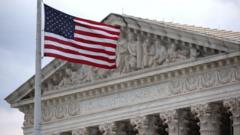In a significant legal ruling, the US Supreme Court has put a stop to public funding for a religious charter school in Oklahoma. Following a 4-4 deadlock on Thursday, the court upheld the decision made by the Oklahoma State Supreme Court that had deemed the public funding initiative unconstitutional. This ruling halts plans for what would have been the first religious charter school in the nation, which was projected to receive $23.3 million in state funds over five years.
The case revolved around a charter school proposed by the Catholic Archdiocese of Oklahoma City and the Diocese of Tulsa, funded by taxpayer money while being independently managed. Although the Supreme Court's decision does not set a national precedent, experts suggest it may influence future legal challenges concerning the financing of religious schools.
Justice Amy Coney Barrett, a conservative member of the court appointed by former President Trump, recused herself without providing details. The court's announcement did not include a formal opinion, simply stating, "The judgment is affirmed by an equally divided Court."
The decision represents a complex clash of ideals surrounding religious freedom in education. Oklahoma Attorney General Gentner Drummond expressed his approval of the ruling, framing it as a protection of religious liberty and a safeguard against funding for extremist religious education. “This ruling ensures that Oklahoma taxpayers will not be forced to fund radical Islamist schools,” he affirmed.
Conversely, advocates for the charter school argued that the rejection of funding based on its Christian affiliation constituted discrimination. Officials stated their disappointment with the ruling and emphasized their commitment to providing parents with educational choices. They announced intentions to seek alternative means for offering virtual Catholic education, which would serve approximately 500 students from kindergarten to high school.
The development follows a contentious approval process for the school, which faced immediate backlash. While Oklahoma Governor Kevin Stitt supported the charter's establishment, Drummond's lawsuit led to the Supreme Court's intervention. Charter schools, which represent a minor segment of the US educational landscape, have become a focal point for many conservative advocates who perceive them as vehicles for parental choice in education. The implications of this ruling are likely to resonate in ongoing discussions about the future of education and religion in public schools.



















